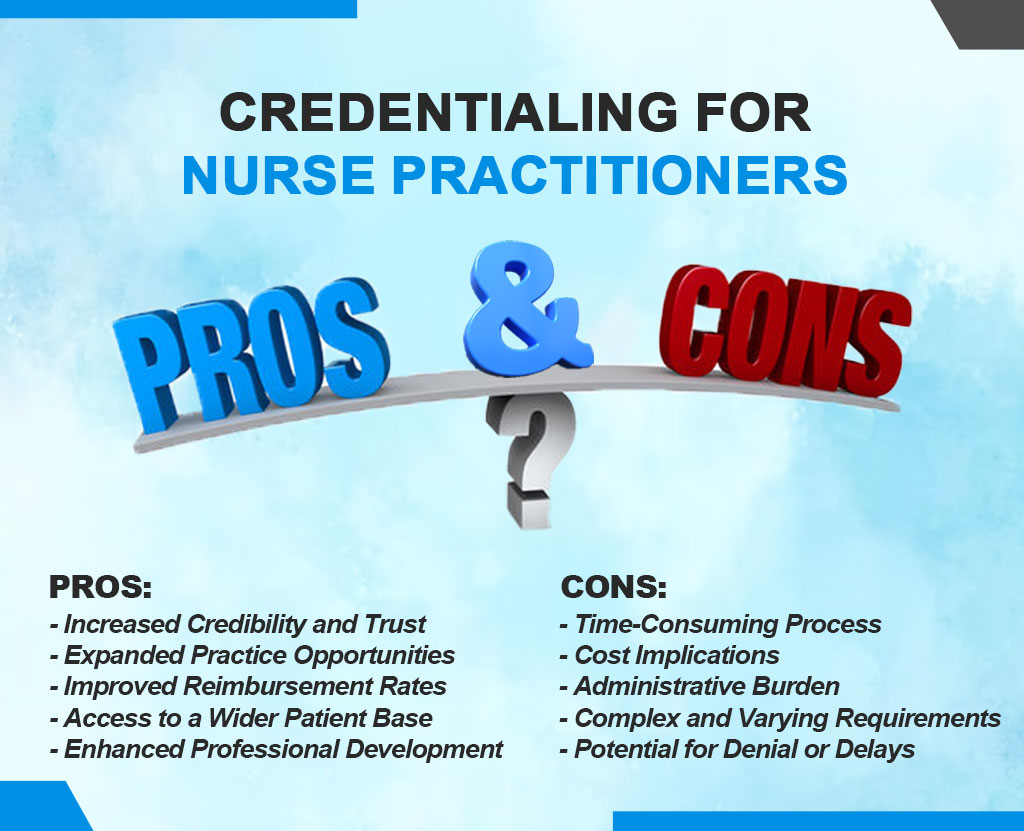Credentialing guarantees high-quality patient care by verifying nurse practitioners’ qualifications and instilling confidence in patients and hospitals. In Florida, US, there are approximately 325,000 licensed NPs, with 88% specializing in primary care. Credentialing for Nurse Practitioner accreditation significantly enhances healthcare quality, leading to a 15% reduction in hospital readmissions.
Certification is essential not just to practitioners but also to the entire healthcare system. First, it minimizes risk; second, it safeguards against legal challenges and nondiscrimination legislation; third, the RITA encourages continued professional development.
The National Commission on Certification of Physician Assistants (NCCPA) also explains that certified PAs are 25% more likely to learn about the new trends in continuing education continuously, enhancing good patient results.
Understanding Credentialing for Nurse Practitioners
The credentialing method is a planned way to check and evaluate the skills of health care workers, like nurse practitioners. As part of this process, an NP’s education, training, license, experience, and abilities are carefully reviewed to ensure they meet the set standards needed to provide safe and effective care.
Credentialing is very important in the healthcare business for several reasons:
Making Sure Patients are Safe
Protecting patients from inexperienced handlers involves scrutinizing the credentials of a nurse practitioner through provider enrollment services.
Maintaining Professional Standards
Credentialing safeguards the integrity and quality of the services in the healthcare industry since it is a mechanism that ensures that anyone providing the services meets the correct standard.
Compliance with Regulations
This ensures that all healthcare workers adhere to federal, state, and local statutes besides statutory and standard-setting organizations’ regulations.
Making reimbursement easier
Insurance companies such as Medicare and Medicaid may require nurse practitioners to be credentialed before they are paid back.
Types Of Credentialing For Nurse Practitioner
Nurse practitioners (NPs) must be credentialed to offer healthcare. It verifies education, training, experience, and licensure.
The primary nurse practitioner certification types are:
Educational Credentialing
Nurse practitioners verification to prove they have met academic criteria. The NP’s MSN or DNP from an authorized university must be verified. Educational records are reviewed to verify coursework and clinical hours are completed.
Licensure Credentialing
License credentialing verifies that the nurse practitioner has a current state license. This includes verifying that the NP is licensed by the state board of nursing where they plan to practice and that they have passed a national certification exam from the American Nurses Credentialing Centre (ANCC) or the American Association of Nurse Practitioners.
Clinic Credentialing
NP clinical competency and experience are assessed during credentialing. Clinical rotations, internships, and prior jobs are documented and evaluated during this procedure. NPs must also demonstrate expertise in specialty-specific clinical skills and procedures.
Professional Credentialing
NP accreditation confirms professional and ethical conduct. This requires recommendations from supervisors, colleagues, or mentors attesting to the NP’s ability and character. Verifying ongoing professional development and continuing education courses to refresh clinical knowledge is also required.
Hospital Privileging
Hospital privilege authorizes nurse practitioners to work in certain hospitals. For hospital care, the credentials committee must assess and approve credentials. This includes complete documentation of the hospital procedures and treatments the NP is authorized to do.
Insurance Credentialing
Nurse practitioners need insurance credentialing to get paid by insurers. This requires NPs to apply to join insurance companies’ provider networks and meet their criteria to get paid for insured patient services.
Medicare and Medicaid Credentialing
Nurse practitioners serving Medicare and Medicaid patients need exceptional credentials. Enrolling with the Centres for Medicare & Medicaid Services (CMS) and following federal billing and reimbursement criteria are required for Medicare and Medicaid credentialing.
Specialty Certification
Nurse practitioners can improve their skills and scope of practice by obtaining specialist certification. The Paediatric Nursing Certification Board (PNCB) and the National Certification Corporation (NCC) offer specialized certification in pediatrics, neonatology, and women’s health. It also involves advanced certifications in acute care, family practice, and psychiatric-mental health.
Process of Credentialing For Nurse Practitioner
Submission Of Application
Professional History Review
Your professional history is thoroughly reviewed after application. Your education and clinical experiences are carefully examined. This guarantees that every element is reviewed and confirmed to demonstrate your remarkable talents, unwavering commitment to the field, and capacity to give high-quality healthcare.
Interview and Practical Test
After a comprehensive review, you may be invited for insightful interviews or practical tests to assess your advanced abilities and knowledge. The credentialing body can evaluate your practical knowledge and ability to apply theoretical knowledge to real-world situations.
Achieving Certification
Credentialing for Nurse practitioner certification is vital. Excellence requires time, devotion, and tenacity. However, earning your nurse practitioner credentials is a testimonial to your professional skills and dedication to patient care. The complex effort will always pay off with career progress, credibility, and the opportunity to provide top-tier healthcare.
Pros and Cons of Credentialing for Nurse Practitioners

Pros
- Increased Credibility and Trust
- Expanded Practice Opportunities
- Improved Reimbursement Rates
- Access to a Wider Patient Base
- Enhanced Professional Development
Cons
- Time-Consuming Process
- Cost Implications
- Administrative Burden
- Complex and Varying Requirements
- Potential for Denial or Delays
Choosing the Right Company - Credentialing for Nurse Practitioners
Selecting the right credentialing company is crucial for nurse practitioners (NPs) to ensure compliance, maintain quality standards, and streamline the administrative process.
Here are the critical criteria to consider:
- Reputation and Experience
- Range of Services
- Cost and Transparency
- Technology and Support
- Compliance Knowledge
Maintaining and Renewing Credentials
Continuous education and training are vital for NPs to stay current with medical advancements and maintain high standards of patient care. Ongoing learning ensures that NPs know the latest treatment protocols and regulatory requirements.
Steps To Renewing Credentials
Renewing credentials typically involves the following steps:
- Review Renewal Requirements: As a rule, it is necessary to check the requirements of a specific certifying body or state board.
- Complete Continuing Education: Complete all necessary coursework, if there is any, to meet for the program through accredited institutions.
- Submit Renewal Application: The renewal application must be accompanied by relevant documents whenever necessary, filled out, and submitted to DMV.
- Pay Renewal Fees: Ensure all the payable fees are cleared as and when due.
- Verify Credentials: It is essential to recognize that some bodies’ credentialing may need to be assessed for practice hours and other professional activities.
Conclusion
Ensuring adherence to practice standards and credentialing for nurse practitioners promotes high-quality patient care and professional integrity. It also safeguards hospitals by ensuring staff are qualified and compliant with regulations.
Maintaining high patient care standards and protecting healthcare practitioners and organizations from legal and regulatory hazards requires proper certification. NPs can focus on patient care by choosing reliable credentialing and provider enrollment organizations.
Credentialing For nurse practitioners seeking to streamline and verify compliance, working with a professional credentialing company like Resilient MBS is wise. These services save time, decrease paperwork, and offer peace of mind.










